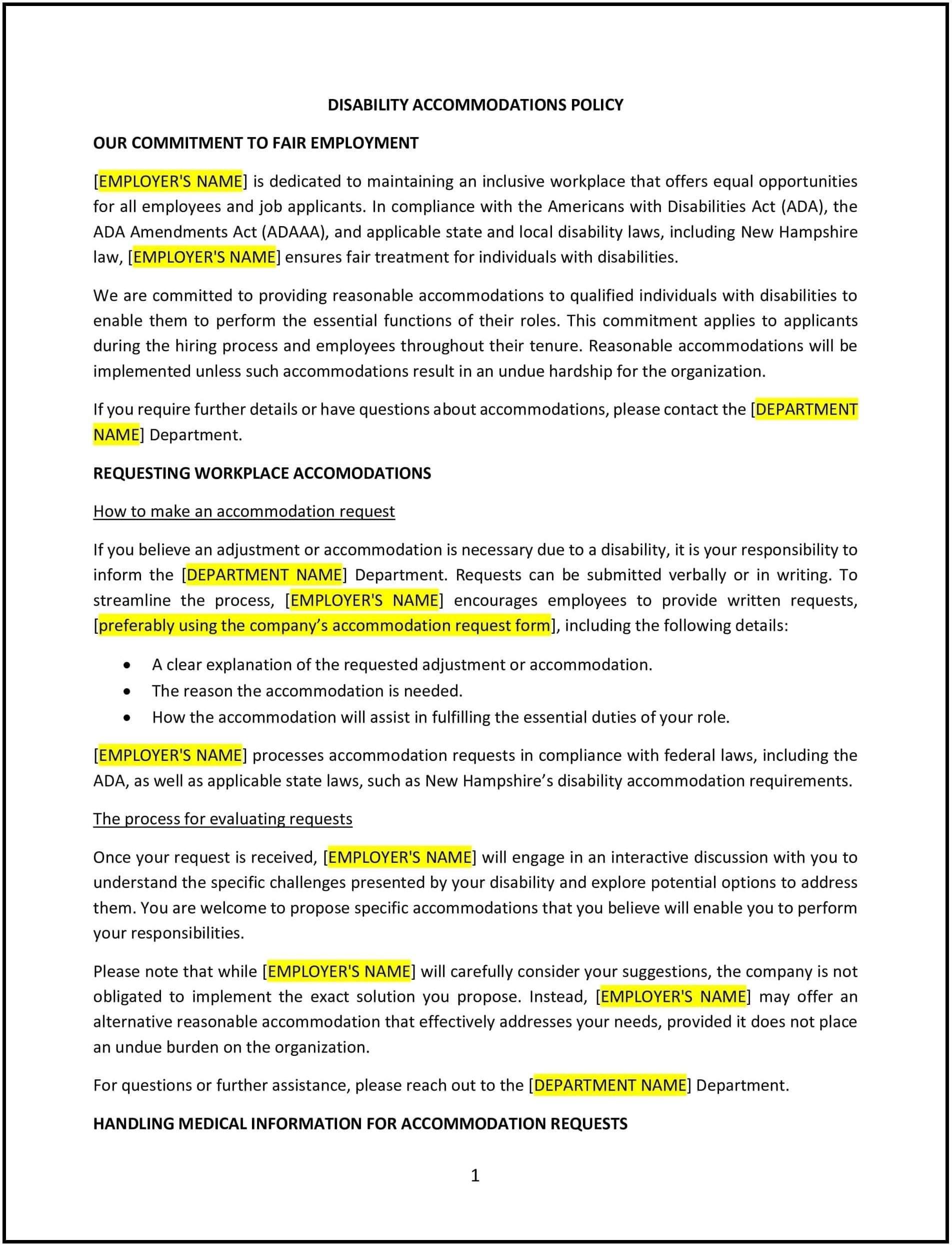Disability accommodations policy (New Hampshire): Free template
Got contracts to review? While you're here for policies, let Cobrief make contract review effortless—start your free review now.

Customize this template for free
Disability accommodations policy (New Hampshire)
A disability accommodations policy helps New Hampshire businesses provide reasonable accommodations to employees with disabilities, ensuring they can perform their job duties effectively while maintaining a fair and inclusive workplace. This policy outlines the process for requesting accommodations, the types of accommodations that may be provided, and the company’s commitment to supporting employees with disabilities.
By adopting this policy, businesses in New Hampshire can foster an inclusive environment, comply with state and federal regulations, and support employees with disabilities in achieving their full potential.
How to use this disability accommodations policy (New Hampshire)
- Define disability and accommodation: Clearly define what constitutes a disability under New Hampshire and federal law (such as the Americans with Disabilities Act) and provide examples of reasonable accommodations that may be offered.
- Set the process for requesting accommodations: Outline the steps employees should take to request accommodations, including how to submit a request, what documentation may be required, and whom to contact within the company.
- Ensure confidentiality: Specify how employee information related to their disability and accommodation request will be kept confidential, sharing it only with necessary personnel involved in the accommodation process.
- Identify possible accommodations: Provide examples of reasonable accommodations that could be offered, such as modified work schedules, assistive devices, or job restructuring.
- Address the interactive process: Emphasize the importance of engaging in a collaborative, interactive process between the employee and employer to determine appropriate accommodations that meet both the business’s and the employee’s needs.
- Establish response timelines: Set a reasonable timeline for responding to accommodation requests and ensuring that employees are informed of the company’s decision.
- Explain undue hardship: Define what constitutes an undue hardship for the business (e.g., excessive cost or disruption to business operations) and explain that accommodations may be denied if they pose an undue hardship.
- Review and update: Regularly review and update the policy to reflect changes in New Hampshire regulations or company practices.
Benefits of using this disability accommodations policy (New Hampshire)
This policy provides several benefits for New Hampshire businesses:
- Fosters an inclusive workplace: Helps create an environment where employees with disabilities feel valued and supported, improving overall workplace morale and diversity.
- Supports legal compliance: Helps businesses comply with New Hampshire state laws and federal regulations regarding disability accommodations, reducing the risk of legal claims.
- Enhances employee retention: Providing accommodations can improve employee job satisfaction and retention by ensuring that employees with disabilities have the support they need to succeed.
- Boosts productivity: By providing appropriate accommodations, businesses can enable employees with disabilities to perform at their highest level, improving overall productivity.
- Reduces potential liabilities: By having a clear and proactive policy in place, businesses can reduce the likelihood of discrimination claims related to disability accommodations.
Tips for using this disability accommodations policy (New Hampshire)
- Communicate the policy clearly: Ensure all employees are aware of the policy, including the process for requesting accommodations and their rights under New Hampshire and federal laws.
- Maintain confidentiality: Keep all information regarding accommodation requests confidential and share it only with relevant personnel involved in the process.
- Respond in a timely manner: Acknowledge accommodation requests as quickly as possible and ensure that employees are informed of the company’s decision in a timely manner.
- Be flexible and engage in dialogue: Work with employees to explore different accommodation options and be flexible in finding solutions that meet both the employee’s needs and the company’s requirements.
- Review the policy regularly: Update the policy periodically to ensure it reflects changes in New Hampshire state laws, federal regulations, or evolving business needs.